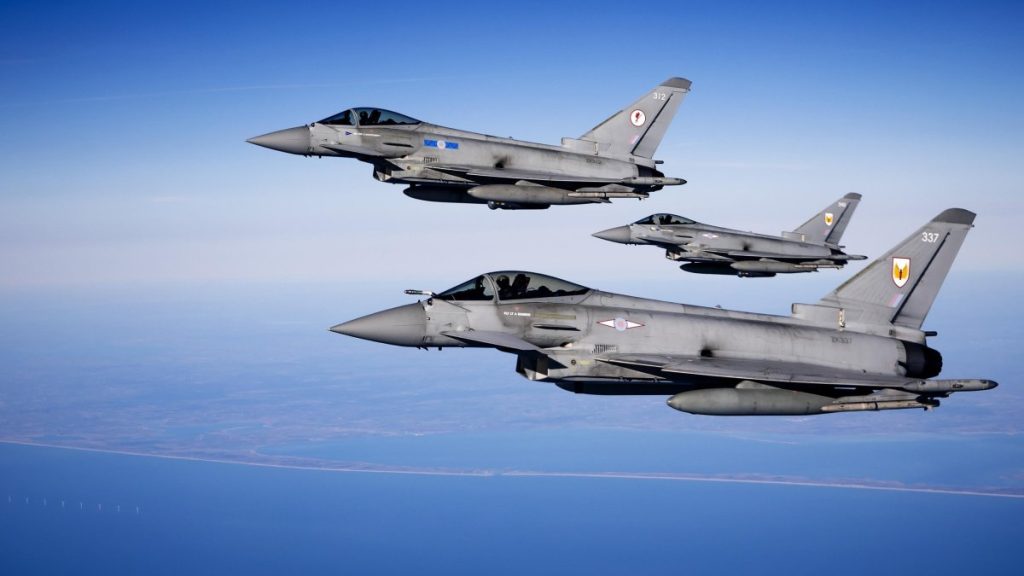Türkiye’s recent efforts to modernize its air force have led it to seek new alternatives following unfavorable developments in the F-35 program. In this context, the country has intensified negotiations for procuring Eurofighter Typhoon jets, produced by a consortium involving the U.K., Spain and Germany, while continuing to develop its domestic air defense systems.
Starting in the early 1980s, several European countries agreed to develop a joint fighter jet to reduce dependency on the U.S. for air defense systems. In 1983, the European Fighter Aircraft (EFA) project was initiated, spearheaded by the U.K., Germany, Italy and Spain. The project was formally launched in 1986 through a four-country agreement, and the first prototype, DA1 (Development Aircraft 1), conducted its test flight in Germany in 1994. By 2003, the first official delivery was made to the German Air Force. Between 2004 and 2009, production and distribution of the Eurofighter Typhoon expanded to other partner countries (the U.K., Italy and Spain). From the 2010s onwards, the aircraft was continuously modernized with electronic warfare capabilities, radar systems and air-to-air and air-to-ground missiles. It was also sold to countries such as Saudi Arabia, Kuwait, Qatar and Oman.
Türkiye, which is still at the application stage for the Eurofighter purchase, has shown interest in the platform, especially after the S-400 and F-35 crises with the U.S. Notably, in 2023 and 2024, Türkiye intensified negotiations with the U.K. and Italy, but tangible results were not achieved due to Germany’s veto. Previously, Eurofighter sales to third countries had been plagued by corruption scandals. For instance, in Austria, legal proceedings are still ongoing over corruption allegations involving politicians and bureaucrats related to the 2000 deal for 24 aircraft. Additionally, there have been international scandals over corruption in the sale of Eurofighters to third countries in both the U.K. and Germany.
Message to partners?
Germany’s opposition to the sale of Eurofighters to Türkiye can be viewed not only through the lens of bilateral relations but also as a signal to its consortium partners – namely the U.K., Italy and Spain – all of whom have strong political and economic ties with Türkiye and are more favorable toward fulfilling Türkiye’s request for 40 aircraft. During the administrations of Chancellor Angela Merkel and Social Democratic Party leader Olaf Scholz, Germany adopted a cautious approach toward the sale. In the 2025 elections, the chancellorship passed to the Christian Democrats under Friedrich Merz, yet the Defense Ministry is expected to remain under the Social Democrats due to coalition dynamics. This raises questions about whether the final decision will lie with the party or the government itself.
Reasons behind resistance
Germany’s stance on arms sales to Türkiye has, since the 2010s, been shaped by what it terms a “values-based foreign policy.” In practice, however, it has been driven by Türkiye’s border policies, domestic politics, and relations with neighboring countries. More specifically, Türkiye’s military operations in northern Syria, tensions in the Eastern Mediterranean, relations with Greece and the Greek Cypriot administration and alleged media and opposition restrictions have all contributed to Germany’s hesitancy. These justifications became more pronounced during the tenure of the Scholz-led coalition government, in which the Green Party played an influential role.
Lobbies, perceptions
Germany’s resistance is also influenced by lobbying and perception-building efforts. Groups such as Armenian, Greek and pro-PKK organizations, which are active in Germany, have been lobbying against Türkiye’s domestic and foreign policy. These groups exert considerable influence, particularly over political parties like the Greens and the Left Party, and work to shape public opinion against Türkiye. As a result of Germany’s stance, Türkiye has sought more direct engagement with other Eurofighter consortium members, such as the U.K. and Italy, who have shown greater openness to cooperation. These obstacles have also further reinforced Türkiye’s commitment to strengthening its domestic defense industry, as seen in the increased focus on developing its National Combat Aircraft, the KAAN project.
Germany’s opposition to the Eurofighter sale to Türkiye should therefore be interpreted not just as a military-technical decision but also as a political and ideological one. This stance reflects both the internal political balance within Germany and a desire to counterbalance Türkiye’s regional power projection. However, it is pushing the country to turn increasingly toward domestic and alternative solutions in the long term.


